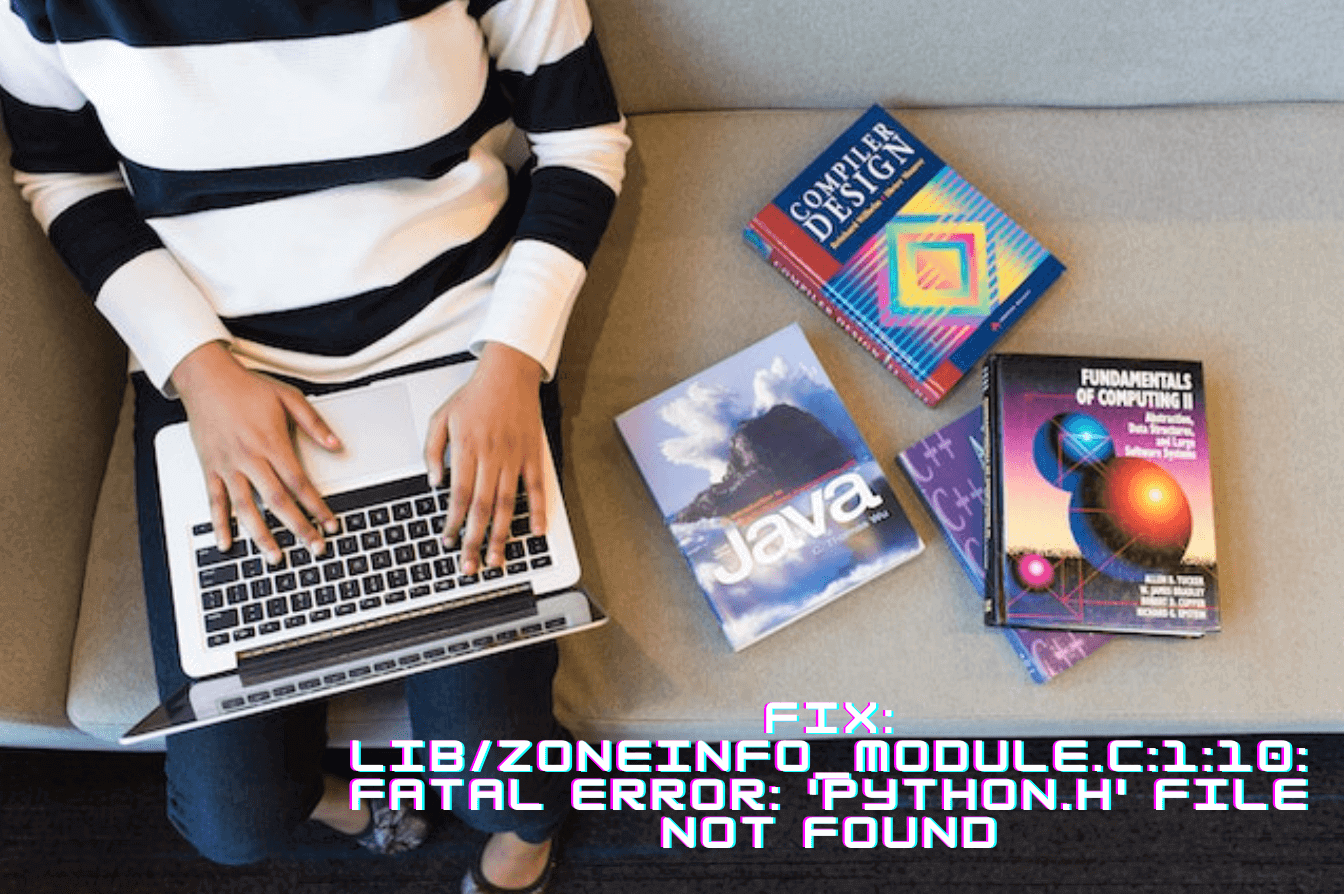FIX: lib/zoneinfo_module.c:1:10: fatal error: ‘python.h’ file not found

This lib/zoneinfo_module.c:1:10: fatal error: ‘python.h’ file not found may occur when you try to use a Python package that relies on the zoneinfo module. If you get this error, don’t worry we got you covered. In this article, we will explain how to fix this error. Before we dive into the solution it’s worth understanding what this error means.
The “lib/zoneinfo_module.c:1:10: fatal error: ‘python.h’ file not found” is a C extension module error for the Python package “zoneinfo” introduced in Python 3.9. It indicates that it is failing to compile because it can’t find the header file ‘python.h’. It can be resolved by installing the header file or modifying the build process.
What causes lib/zoneinfo_module.c:1:10: fatal error: ‘python.h’ error?
This python.h header file is part of the Python development package and contains declarations for functions and types that are used in C extensions for Python. This header file is used by GNU Compiler Collection (gcc) for building applications. If the python.h header file is missing, it means that your system is missing the necessary development files to compile Python extensions.
- This can happen if you haven’t installed the Python development package for your system, or if the package is installed but not configured properly.
- Other possible reasons for this error include incorrect installation of Python, environment variables that are not properly set, or a corrupted Python installation.
- In general, this error is a result of missing dependencies, and can usually be fixed by installing the necessary development packages or correcting the configuration of the existing packages.
How to Fix lib/zoneinfo_module.c:1:10: fatal error: ‘python.h’ error?
To fix this lib/zoneinfo_module.c:1:10: fatal error: ‘python.h’ error the python-dev package needs to be added system-wide to install the header files and static library for your particular version of Python. Follow the following steps:
Solution 1:
Install the missing Python development package
If your operating system does not come with a Python development package. You can Install it by opening the command prompt and running the command given below which is according to Operating System installed on your system and package manager.
For Debian (Ubuntu)
# For Python version python2.x sudo apt-get install python-dev build-essential
# For Python version python3.x sudo apt-get install python3-dev build-essential
# For ubuntu 16.04 with python 3.6 sudo apt-get install python3.6-dev build-essential
For openSUSE (zypper)
# For Python version python2.x sudo zypper in python-devel
# For Python version python3.x sudo zypper in python3-devel
For Alpine Linux (apk)
# For Python Version python3.x sudo apk add python2-dev
# For Python Version python3.x sudo apk add python3-dev
For Cygwin (apt-cyg)
# For Python version python2.x apt-cyg install python-devel
# For Python version python3.x apt-cyg install python3-devel
For Rasberry Pi (apt)
sudo apt-get install python-dev
For Fedora (dnf)
# For Python version python2.x sudo dnf install python2-devel
# For Python version python3.x sudo dnf install python3-devel
For CentOS / Redhat
# For Python version python2.x sudo yum install python-devel
# For Python version python3.x sudo yum install python3-devel
# If you are using `Python 3.6` on Amazon Linux (RHEL) sudo yum install python36-devel
# For CentOS 7 sudo yum install python36u-devel
Add library and include paths
A second thing to note is that Python libraries are not by default linked with executables, nor are include files by default in the include path. Here are the flags you need to add to Python:
-I/usr/include/python2.7 -lpython2.7
-I/usr/include/python2.7 -lpython3.7
You can replace the python version according to your requirements.
Compile Command
Now, compile the above commands as follows:
gcc -Wall -I/usr/include/python3.7 -lpython3.7 utilsmodule.c -o Utilc
gcc -Wall -I/usr/include/python2.7 -lpython2.7 utilsmodule.c -o Utilc
Solution 2:
Check Python header files Location: The python.h header file is located in the include directory of your Python installation. To find the location of the included directory, you can run the following command:
sudo find / -iname 'Python.h'
Output
This will output the location of the included directory, as well as any other necessary flags for compiling Python extensions.
/usr/include/python3.7/Python.h
/usr/include/python3.8/Python.h
/home/borislav/anaconda3/include/python3.7m/Python.h
/home/linuxbrew/.linuxbrew/Cellar/python@3.8/3.8.13_1/include/python3.8/Python.h
Now install the python-dev files for the specific versions of Python 3.7 and 3.8 for example.
sudo apt-get install python3.7-dev build-essential # python3.7
sudo apt-get install python3.8-dev build-essential # python3.8
Set the PYTHONPATH environment variable: Make sure that the PYTHONPATH environment variable points to the correct Python installation directory. You can set the environment variable using the following command:
export PYTHONPATH=/usr/include/python3.X # replace X with your Python version
Reinstall Python: If your Python installation is corrupted, you may need to reinstall it to fix the issue. You can use the package manager for your operating system to reinstall Python.
After completing the above steps, you should be able to install or use the zoneinfo module without encountering python.h file not found error.
Conclusion:
In conclusion, the “lib/zoneinfo_module.c:1:10: fatal error: ‘python.h’ file not found” error can occur while working with the zoneinfo module in Python. This error usually indicates a problem with the Python development environment setup, such as missing files and libraries or incorrect configuration. To solve this error, you need to ensure that the necessary dependencies are installed and configured properly on your system. I hope you will resolve this error after following the given solutions.
Good Luck with your Learning !!
Related Topics:
Fix – TypeError: tuple indices must be integers or slices not str
TypeError: method() takes 1 positional argument but 2 were given
Fix – ImportError: cannot import name force_text from django.utils.encoding
Coding Spell | Python Journey | About Us
- How To Find the Length of a List in Python - 16 October 2023
- Python Program to Swap Two Variables - 16 October 2023
- How to Check if a Variable is Null in Python - 14 October 2023
